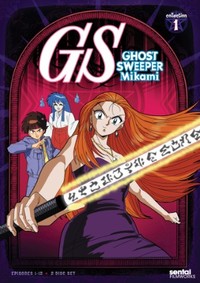Shelf Life
The Ghost Whisperer
by Erin Finnegan,

One Piece - Collection 1 DVD
Rental Shelf
Ghost Sweeper Mikami Collection 1 DVD Disc 1
Perishable
Nothing this time
Flushable
YuruYuri ep. 1-5
The power never went out, so I managed to amuse (or torture?) my friends with the first 26 episodes of One Piece while we rode out the storm.
 I started reviewing One Piece with Season Two Part Three, so I missed the first 79 episodes. These new collections are a good opportunity to catch up. I watched season one with friends who were new to the show, and I think I was better off starting in the middle and then going back. I knew the show would get better, but for my friends, the first 20 episodes were merely fights loaded with oddly-themed pirates, including clown-themed pirates, cat-themed pirates, and one particularly strange Michael Jacksonesque pirate. It wasn't until episode 26 that One Piece finally delivered the kind of emotional punch to the gut I've come to expect from the show. Sanji's "why I became a chef" story is so dramatic and serious it's hard to watch. This is a children's show, right?
I started reviewing One Piece with Season Two Part Three, so I missed the first 79 episodes. These new collections are a good opportunity to catch up. I watched season one with friends who were new to the show, and I think I was better off starting in the middle and then going back. I knew the show would get better, but for my friends, the first 20 episodes were merely fights loaded with oddly-themed pirates, including clown-themed pirates, cat-themed pirates, and one particularly strange Michael Jacksonesque pirate. It wasn't until episode 26 that One Piece finally delivered the kind of emotional punch to the gut I've come to expect from the show. Sanji's "why I became a chef" story is so dramatic and serious it's hard to watch. This is a children's show, right?In the meantime, I had to field a lot of questions from my One Piece newbie friends. Q: "What is the One Piece, anyway?" A: It is (as the opening explains) the treasure that the King of the Pirates left somewhere out on the Grand Line (a vast and dangerous ocean). Q: "Do we get to find out what the treasure is?" A: Not yet, but I have heard second hand Eiichiro Oda has something in mind.
Particularly in these early episodes, most of the show is about reaction shots. A character reaction with a humorous and/or grotesquely exaggerated face must be comic gold if you're a ten year old Japanese boy, but these visual rimshots didn't do much for my friends. I've learned to nod sagely at such shonen comic gags, which rarely make me laugh, but make up almost 20% of early One Piece content. (I'd like to see someone do real math on this.) Additionally, the Funimation dub translation deftly navigates some of the more egregious eye-rolling Japanese puns.
Although I enjoy the 12 episode sets of One Piece that I've been reviewing for Shelf Life so far, I recognize that 26 episode sets like this might be a more sane way to collect the series with the pretense of frugality. That said, marathoning this entire box in 48-hours was a bit much, even for me. Nevertheless, if you start collecting One Piece with this set, by the time you reach episode 205, Funimation will probably have 206+ ready.
Maybe episode 19 is a good place to start watching One Piece if you're short on time. Has anyone written a guide of un-skippable episodes out there on the internet somewhere?[TOP]
Much of early One Piece is comedy, and by coincidence it proved to be an anime comedy week for me. The trouble with comedy is that it's often hit or miss.
 Yuruyuri trudges along a well-worn path of 4-koma based series like Azumanga Daioh and Lucky Star with simple character designs and short gag-based stories, only somehow more generic feeling, as if there are dozens of mediocre 4-koma comics about groups of schoolgirls, and here is another one. I liked Azumanga Daioh (the manga is better) and Lucky Star (the anime, after episode four), but reacted to Yuruyuri as if I was allergic to it.
Yuruyuri trudges along a well-worn path of 4-koma based series like Azumanga Daioh and Lucky Star with simple character designs and short gag-based stories, only somehow more generic feeling, as if there are dozens of mediocre 4-koma comics about groups of schoolgirls, and here is another one. I liked Azumanga Daioh (the manga is better) and Lucky Star (the anime, after episode four), but reacted to Yuruyuri as if I was allergic to it.Akari joins the same club as her slightly older friends as soon as she starts middle school. With no purpose in mind, the girls call themselves the "Amusement Club" and meet in the tea house of the recently disbanded tea club. (If only this show were about the tea club instead! I'd love to see a tea ceremony anime! In theory, anyway; that would probably be intensely boring.)
Akari and friends bumble through their junior high days not doing much, save for making a lot of lesbian jokes and having girl-crushes on each other. More often than not, the punch line is "lesbians!". In a world of infinite possibilities, that could be funny. (I think Hayate X Blade is funny, and the punch line is sometimes "lesbians!".)
Sure, Yuruyuri is filled with humor signifiers, but in terms of semiotics, I am sadly unqualified to explain how it fails to be funny. I felt more like I was collecting data than watching a television show.
I was especially annoyed with Chitose, a student council member who takes off her glasses to nosebleed-fantasize about her classmates. I didn't find her fantasies particularly evocative or the meta-joke about her fantasies to be funny. Instead, she stops the plot (insomuch as there is one) dead in its tracks for what feels like minutes at a time. Her scenes could've just as easily been DVD Extras, they feel like such dead weight in the show. It's too bad, because they might well be the point of the show. If you're on board for Chitose's gags, this Yuruyuri is for you.
Yuruyuri isn't poorly animated, but it sets the bar low with few locations and a lot of talking scenes (cheap to animate!). The show is self-aware enough to admit that Akari is unmemorable and weak as a protagonist, but pointing it out so frequently made it even harder to watch. It's as if the manga author wasn't trying very hard. After so many anime series about trying one's best or giving it your all, Yuruyuri is extra-frustrating. If Namori isn't trying very hard to make a memorable protagonist, I hardly feel like expending the effort of watching the anime based on his manga. Call me bloodthirsty, but I'd rather watch something created with blood, sweat and tears.
All of the characters are so forgettable and cliché-based (the blonde Kyoko is like a taller Konata from Lucky Star) that eventually I started to wish I was watching Hidarmari Sketch instead. Those characters were in art school, which is a minimal premise…
At least this show wasn't upsetting like Maria Holic or incoherent like A Dark Rabbit Has Seven Lives. Rather, Yuruyuri is middle of the road and (hopefully) forgettable. [TOP]
For the final comedy of the week, I watched an old forgotten title that's being released on DVD by Sentai Filmworks.
 I rented the first disc of Ghost Sweeper Mikami (GSM) some time ago, since it's been coming out this year. Releasing the 46 episode series in four collections seems like an odd decision. One or two sets would've been a better choice.
I rented the first disc of Ghost Sweeper Mikami (GSM) some time ago, since it's been coming out this year. Releasing the 46 episode series in four collections seems like an odd decision. One or two sets would've been a better choice.Anyway, back in 2002, I was unimpressed with the GSM movie which I may have watched at Otakon or on a VHS fansub. I recalled my vague first impression of GSM not being something I was particularly interested in, and let this rental DVD settle to the bottom of my review pile (for months, apparently).
There was a time when every anime series looked like GSM, with round-faced, poofy-haired girls and maybe a dude with a headband. Ghost-girl Okinu-chan looks a lot like Botan from Yu Yu Hakusho (which I reviewed last month), and it's no wonder, GSM debuted in 1993 and YYH in 1992. Perhaps both series are from a big early-90's supernatural anime/manga trend.
Title character Mikami is a high-heeled exorcist in it for the money. She charges exorbitant fees for her ghost busting services, all the while paying her assistant Tadao less than minimum wage. Tadao begrudgingly puts up with it, trading profitability for chances to flirt with ladies and the occasional moment of accidental intimacy with Mikami (some courts might call these moments sexual harassment). Rather than being irritated by the lecherous Tadao, I found him a pleasantly nostalgic in the tradition of Urusei Yatsura or Golden Boy.
I was surprised to find the first handful of episodes downright enjoyable, compared to my experience with the movie. Sure, GSM looks aged, but some noticeable effort went into the animation. The first six episodes take place over a diverse range of locations (a mountain resort, a Tokyo bank, outer space), with a decent amount of action (car chases, etc.). (Compare this to Yuruyuri, which has fewer incidental characters, more talking and less walking.)
Japan's economic bubble burst in 1991, which is the same year the GSM manga series came out. In a historical context, Mikami's obsession with money and her expensive taste makes total sense. Watched during today's economic malaise, Mikami seems even more crass than she was probably intended. Her fees are often punch lines, and Sentai Filmworks has gone to some lengths to provide on-screen translation notes about the prices Mikami throws around, adjusted for present-day exchange rates. Unlike in a fansub production, these notes stay on screen long enough to read them without having to hit pause.
GSM is amusing, but it isn't terribly memorable. It's not the sort of thing I'd recommend to casual fans of anime or anime newbies. It might be a nice show to watch at anime clubs screening a mix of old and new titles at meetings.
There is no dub, but I hardly think an older series like this requires it. GSM is old enough that I'm hesitant to continue reviewing it for Shelf Life. The episodes are all stand-alone so far, so I could conceivably skip to more recent releases if anyone is interested.[TOP]
Some new review copies are headed my way, but while I wait for them I'll probably watch another rental that's been collecting dust, Kashimashi, along with another show from the summer season, The Mystic Archives of Dantalian. See you next week!

This week's pics are from Karl, Kevin, and Stephen:
"I've always been a big collector of DVD's and videogames but about a year and a half ago I discovered anime. It started with me finding titles like Cowboy Bebop and Fullmetal Alchemist and soon my two brothers and I were hooked. We've been buying anime like crazy recently and there's no end in sight. We've only recently begun to buy manga. At any rate, these are our pics of anime, DVD's, videogames and whatever else. Hope you like them."








Aww, cute clock.
Want to show off your stuff? Send your jpgs to shelflife @ animenewsnetwork . com. Thanks!
discuss this in the forum (42 posts) |